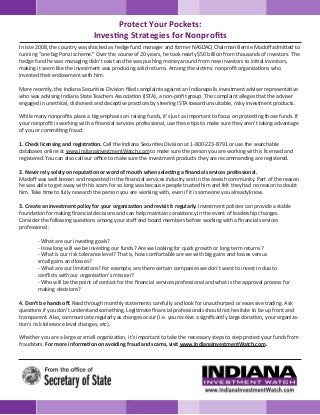
Investing Strategies for Nonprofits
- 1. In late 2008, the country was shocked as hedge fund manager and former NASDAQ Chairman Bernie Madoff admitted to running “one big Ponzi scheme.” Over the course of 20 years, he took nearly $50 billion from thousands of investors. The hedge fund he was managing didn’t exist and he was pushing money around from new investors to initial investors, making it seem like the investment was producing solid returns. Among the victims: nonprofit organizations who invested their endowment with him. More recently, the Indiana Securities Division filed complaints against an Indianapolis investment adviser representative who was advising Indiana State Teachers Association (ISTA), a non-profit group. The complaint alleges that the adviser engaged in unethical, dishonest and deceptive practices by steering ISTA toward unsuitable, risky investment products. While many nonprofits place a big emphasis on raising funds, it’s just as important to focus on protecting those funds. If your nonprofit is working with a financial services professional, use these tips to make sure they aren’t taking advantage of you or committing fraud: 1. Check licensing and registration. Call the Indiana Securities Division at 1-800-223-8791 or use the searchable databases online at www.IndianaInvestmentWatch.com to make sure the person you are working with is licensed and registered. You can also call our office to make sure the investment products they are recommending are registered. 2. Never rely solely on reputation or word of mouth when selecting a financial services professional. Madoff was well known and respected in the financial services industry and in the Jewish community. Part of the reason he was able to get away with his scam for so long was because people trusted him and felt they had no reason to doubt him. Take time to fully research the person you are working with, even if it is someone you already know. 3. Create an investment policy for your organization and revisit it regularly. Investment policies can provide a stable foundation for making financial decisions and can help maintain consistency in the event of leadership changes. Consider the following questions among your staff and board members before working with a financial services professional: - What are our investing goals? - How long will we be investing our funds? Are we looking for quick growth or long term returns? - What is our risk tolerance level? That is, how comfortable are we with big gains and losses versus small gains and losses? - What are our limitations? For example, are there certain companies we don’t want to invest in due to conflicts with our organization’s mission? - Who will be the point of contact for the financial services professional and what is the approval process for making decisions? 4. Don’t be hands off. Read through monthly statements carefully and look for unauthorized or excessive trading. Ask questions if you don’t understand something. Legitimate financial professionals should not hesitate to be up front and transparent. Also, communicate regularly as changes occur (i.e. you receive a significantly large donation, your organiza- tion’s risk tolerance level changes, etc). Whether you are a large or small organization, it’s important to take the necessary steps to step protect your funds from fraudsters. For more information on avoiding fraud and scams, visit www.IndianaInvestmentWatch.com. Protect Your Pockets: Investing Strategies for Nonprofits